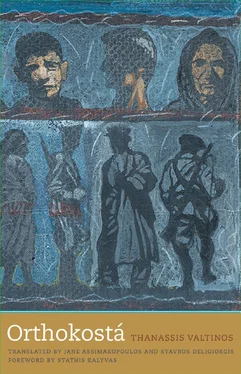— Was Pavlákos there?
— When I went he wasn’t there yet. The other men were there. Kléarhos, Velissaróyiannis, 3Mavromantilás. They were the leaders. At night they got us and took us to Ayiopétro. 4The girls come in, Anthí—no not Anthí, Sotiría, she brings me a blanket. She puts it right in my hand. And there I was in these sandals. They said they were taking us to Ayiopétro for questioning. They take us there, they shove us in some cellar dungeon. The next day they move us. They put us in line to send us off to the detention camp. As we’re going there, Pavlákos comes along. There were about twenty of us. Lyghítsos’s wife Eléni was there.
— Is Eléni alive?
— She is, she’s in Athens. Pavlákos comes over, he comes up next to me. He says, When they question you say that you’re willing to work for the Organization. 5That was his advice to me.
— Pavlákos may have been whatever he was, but he wasn’t a die-hard Communist. He would cover for our fellow villagers. He was the one who helped Kalosynátos escape.
— Yes, but let me continue now. And as we were about to get started, Pavlákos says, Wait, I have to announce something to you. Just this minute, he says, they went to Koubíla to burn down the Makrís family’s houses, his exact words, and to take in the rest of the family, and they didn’t find anyone. They’d left for Másklina. They went to the Germans. And Kléarhos said, Looks like they were traitors.
— Didn’t he say anything to tip you off, all he did was make that announcement?
— That’s why they arrested her. That’s how her brothers left. But she didn’t start it right.
— How my brothers left is another story. I’m telling how they arrested me.
— They arrested you, that’s why they arrested you.
— They took us to the detention camp. We go inside. The balconies are packed full. Yiórgos Kontós from Karakovoúni. Mítsos Kapetanéas, Chrístos Petrákos, Nikólas’s brother, Dímos Kokkiniás, Thanásis Grigorákis, someone named Theodorópoulos from Dolianá, and Panayotoúros. Let me try and remember them.
— Themistoklís?
— Themistoklís and I went to the detention camp together. With his brother Chrístos.
— They had Chrístos in the detention camp too?
— They did. They beat him something awful.
— Which Chrístos?
— Anagnostákos. Themistoklís’s brother.
— Did they beat him too?
— They did. Don’t interrupt me, because I’m going to tell it all. He’s dead now. We went there, we go in. I was lost, there were so many people. We lie right down. I lay out the one blanket your sisters had given me. I lie down and pass out. They come in, Get up, Chrysanthe says to me, get up, it’s nighttime. I get up, they take us up to the cells. Going up, on the stairs I see Nikítas Braílas with his mother. I start crying. A man named Yiorgátsis comes in, worked at the detention camp. I don’t know where he was from. Girl, you should have cried those tears for your brothers. For my brothers, so they wouldn’t leave for Másklina. They take us upstairs, the cells are all full. They take us out on a balcony. Me, Lyghítsos’s wife Eléni, a couple of women from Ayiasofiá, and one from Tegéa, a young girl. I put the blanket in front of us on the railing. And we waited. Vasílis Tóyias comes by. He tells me.
— Tóyias was there?
— He was the camp commander. Tóyias from Mesorráhi. He was killed. And Stratís Karadímas. The General, we could say. He came in, he put a fright in me, We’ll cut off your hair, you. 6Why cut off my hair, just put a bullet in me. And Tóyias says to me, No, you’re a hostage, we’re holding you because of your brothers. We’ll cut the hair off the other women. Thirty-six days I was a hostage. I wouldn’t eat. They’d give us watery soup with flies in it and a tiny piece of bread. Like a piece of antídoron . 7They’d tell us: Any of you don’t eat your bread, you take it with you. I didn’t eat. I was going out the door one day. Why don’t you take your bread with you, the General asks me. You think we give a damn that you don’t eat? I didn’t answer him. Then that Tóyias gave us a speech. They gathered us in the church. And this is what he said, I heard every word of it. Like for example, if Makrís, Yeorghía’s father, does anything for the Germans right now, of course his daughter will pay for it. He said that in his speech. Three days later they took me to be questioned. There was a hunchback there in a large cell, with firearms in it. He says to me, Come over here, are you going to tell us the truth or do you want to go to the hole. I got scared. I didn’t know about holes, didn’t know what they were and what they did. I found that out later there. But I was scared. Very scared. He was a deformed man, that interrogator, a hunchback. He says, Who were your brothers with, what was their relation with the Germans? I say, Our men were at home, they didn’t have relations with anyone. They arrested me in Kastrí, and I found out that they left. I don’t know what happened in between. He says, Did they say anything in defense of the Germans? In our house, I say, never. Never heard any talk like that. And he says, If we give you a gun now will you go and kill your brothers who went with the Germans? I say, No, I won’t go. Why, you afraid of the blood? I am, and especially of my brothers’ blood. He kept trying to get me on his side. One hour of questioning. It was crazy. Finally he says to me, If we give you a position will you work? Yes, if you give me one, I say. I mean, if we send you to a hospital. I say, If you send me there I’ll go. And then when they sent us to Prastós and Lyghítsos’s wife Eléni came down with typhus, they put me in charge of her care, I had her, and I had Themistoklís. His care was different, rubdowns and salves for Themistoklís.
— To the village of Prastós?
— To the village of Prastós.
— They took Themistoklís there?
— And then they took us up to the mountains. They made Panayótis, Iraklís’s brother, play the clarinet. And they danced. Well, anyway. It’s all a muddle.
— And when the Germans came they took you.
— When the Germans came we went and gave ourselves up. But we had got some water earlier. There was a drinking fountain. Look, girls, down there down by the wild pears, one of them said. We got water. Someone, a tall man, says, Who’s that girl, and Vasílis Tóyias said, She and her whole family are in deep with the Security Battalions. 8About me. We took the water, and on the road the man who had asked about me stopped us. He tells us, I’m Alímonos, and he turns to me, he tells me, I killed Ioannítzis from your village over there. Right there, he says to me. He showed me a hillside. A beautiful hillside. His head is planted under a pear tree. That’s what he said. Then I was really frightened. They took us farther up. It was hot. We tell Panayótis, Play a song. I told him that. To cheer us up. I will, he says. But first I’ll play a funeral dirge. We all gave a shudder. No, no, Panayótis, don’t do that. I don’t remember if he played anything. And that night, at twelve o’clock, they killed him. They kept them behind, they sent us away. The men took us there, the rebels, along the way they began to talk. What are you saying, what’s going on? Nothing, stay close to us. It was pitch dark. They took us to those shepherds. I couldn’t reap grain. I didn’t know how. They wouldn’t give me anything to eat. Chrysanthe went and reaped the grain for me. Later we saw the Germans. They were swimming in the stream. We gave ourselves up; they took us back to Orthokostá. Kalabakóyiannis comes in, he tells us, Tonight they killed Braílas’s mother, and Maraskés, and Themistoklís. And Panayótis Polítis. They were killing them all night, and that woman from Trípolis, they smashed in her head with the butt of a gun, left her dead on the spot. I got out safe. From Orthokostá they took us to Leonídio. I went to the school, the Boínis sisters were in there. Prisoners. Alexandra and the other one. They were crying. I ask, What’s wrong with them, someone tells me, They found out their brothers were killed. I felt sorry for them, I went over to them, I say, Don’t cry, girls. I said that like a good Christian, they didn’t answer me. I go outside, I run into Iraklís Polítis. Yeorghía, are the Boínis girls in there? No, I tell him, and he didn’t go in. He believed me. We went to the seafront. There were people in line waiting to get into the caïques. Lots of people. From the Orthokostá detention camp, people the rebels had taken to Xerokámpi. I found Tasía Kambýlis there and Matína Lymbéris, Chía’s sister, I found Tasía’s brother Stamátis. Iraklís comes in angry as can be, I could kill you now, Yeorghía, in front of your brother, who cares? Just because I hadn’t given away the Boínis sisters. Go away, I tell him, get away from me, leave me alone. And then I see those very women, they’re escorting them somewhere. They took them away, and they disappeared among the vegetable plots. They took them. Much later I learned they had executed one of them. From Leonídio we went to Náfplion. And from Náfplion up to Eleohóri. To Másklina. They come and tell me, They want you. They had taken someone in. My aunt tells me, You’d better go in case it’s someone innocent and they kill him for no reason. I go out into the street, Chrysanthe tells me, It’s that man. The one who told me at the detention camp I should be crying those tears for my brothers. Well, there he was again, right there in front of me. Lígdas says to me, We’re counting on you. Lígdas from the Security Battalions. As we’re talking I hear a voice coming from downstairs at the school. They were holding him in the basement. Hey, Yeorghía, it’s me. Who’s that? Yiórgos, don’t you remember me? Oh, Yiórgos, it’s you. You’re holding him prisoner, I say. In the end, they let the man go free. The next day we get on the train to go to Trípolis. Our parents stay up in Eleohóri. They stayed with our uncles. Kákos Barbitsiótis was on the train. So was the man they’d let go. He says to him, You should light a candle for this woman as long as you live. Because now you’d be hanging from a plane tree, at the hands of those Germans. We went to Trípolis. The Germans left, the Security Battalions left, they went to Spétses. Then the rebels came in. One day there’s a knock on our door. Someone says, I want Yeorghía. It was him. He says, If they harm you, if they bother you in any way, you let me know immediately. I’ll be at the jail. I’m a guard. He was grateful for my kindness to him. But nothing happened to us. No one bothered us. Except for that man who wanted to marry me.
Читать дальше


